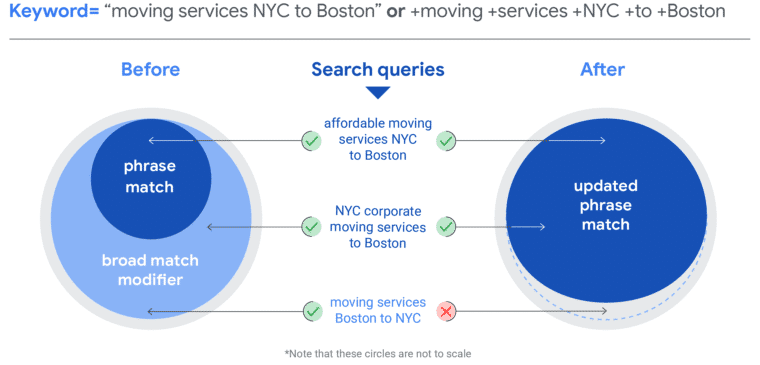Agency POV
Google recently announced that they will be making significant changes to the way phrase and broad match modifier (BMM) keywords trigger ads for various search terms. Essentially Phrase and BMM keywords will be combined into one overarching match type. The current Phrase match type will expand to cover broad match modifier traffic while still leveraging word order when it relates to the meaning and context of the search term. Depending on the structure of your search account, this update could require some significant refinements, or may have minimal impact.
How Will Phrase Match Change?
Google provides a great visualization of how this update will impact the matching behavior using an example of keywords for a moving service from NYC to Boston. The biggest thing to note here is that the updated phrase match will not show an ad for a search term that called out moving from Boston to NYC, while the previous BMM keyword would have triggered an ad because it doesn’t account for word order.

Image Credit: Google
Most importantly, advertisers should note that the updated phrase match keywords will continue to respect word order when it relates to the meaning of the search term. Although Google states they will prioritize word order when contextually relevant, this function will definitely need time to develop and could hurt performance for advertisers in industries where word order completely changes the context of the query. To further help visualize the change, Google also provided some additional examples of how matching behavior will change after the update:
|
Broad match modifier keyword |
Queries that will no longer match after the update |
| +resume +services | what are some customer service skills to put on a resume |
| +best +sneakers | best prices on sneakers for toddler |
| +used +printers | companies that used daisy wheel printers |
| Phrase match keyword | Queries that will match after the update |
| “holidays in zambia” | holiday spots in zambia |
| “long sleeve dress” | long sleeve lace dress |
| “womens boots” |
new womens size 37 boot |
How/When Will Broad Match Modifier Change?
Google stated that they will be “phasing out support for broad match modifier”, but what exactly does that mean? According to Google, “both phrase match and broad match modifier keywords will begin to transition to this new matching behavior”, slated to go live on February 18th. Most importantly, advertisers won’t need to take any initial action because the new behavior will be applied to both match types. This will also allow advertisers to keep all of their keyword-specific performance data.
In July of 2021, however, this new keyword behavior is slated to be rolled out globally and will mean that advertisers are no longer able to create broad match modifier keywords. That said, the existing BMM keywords in your campaigns will still serve under the new behavior and will not be removed from the account.
What does this mean for advertisers?
The answer to this question will definitely vary depending on the structure of your search accounts, how you leverage the various keyword match types, and your reliance on Google’s automated bidding strategies. That said, Google states that this update will “make it easier to reach the right customers on Search”, although this is very much up for debate in the search marketer community.
One of the main goals of Google’s update is to push more advertisers to use their automated bidding strategies. By removing BMM keywords from the mix, Google is essentially removing one optimization lever, changing the functionality/behavior of another optimization lever, and stripping away the amount of data available to advertisers, causing them to rely more on the insights/recommendations provided by Google’s algorithms. Although leveraging automated bidding strategies can save some advertisers a lot of time and effort, it’s not always the right fit for every account. The decision to leverage automated bidding strategies is largely dependent on the amount of time you are able to spend on the account and the level of control you desire when optimizing, as well as on conversion volume and data density (depending on the desired bid strategy).
While this update will definitely help streamline account management due to a reduction in the sheer volume of keywords in the account for most advertisers, there are two types of advertisers that will likely lose out more than others because of this update:
- Small accounts. Small accounts simply don’t benefit from machine learning as much as larger accounts because they have less data that Google can use to inform their machine learning algorithms. More data = better machine learning.
- Accounts that rely heavily on BMM. Accounts that rely heavily on BMM keywords may lose significant traffic because the updated behavior will be more restrictive than the old BMM behavior. This also limits the keyword discovery that could be accomplished by BMM keywords.
Regardless of how your account is structured or if you leverage Google’s automated bidding strategies, there are a few things you should consider doing as Google begins to roll out these changes:
- Get a baseline of performance across your accounts, specifically taking note of how Phrase and BMM keywords are performing. This will give you a good idea of what to expect as these changes start to roll out.
- If you are heavily reliant on BMM keywords, you will likely need to update your strategy or build out your keyword lists significantly to offset the decrease in traffic that is likely to occur with this update.
- If you leverage an even mix of Exact, Phrase and BMM keywords, we recommend pausing all of your BMM keywords as soon as possible to limit the amount of traffic from those keywords. The more traffic coming from BMM keywords, the less you’ll be able to analyze the effect of these changes.
- Audit your existing keyword lists to remove redundant keywords that can dilute the accuracy of the new keyword data in your account. Regularly check the Recommendations page of your account, specifically the “Add new keywords” and “Remove redundant keywords” sections.
- Regularly audit the search terms report to identify new keywords/additional negative keywords that may sneak through the cracks under the new match type behavior.
